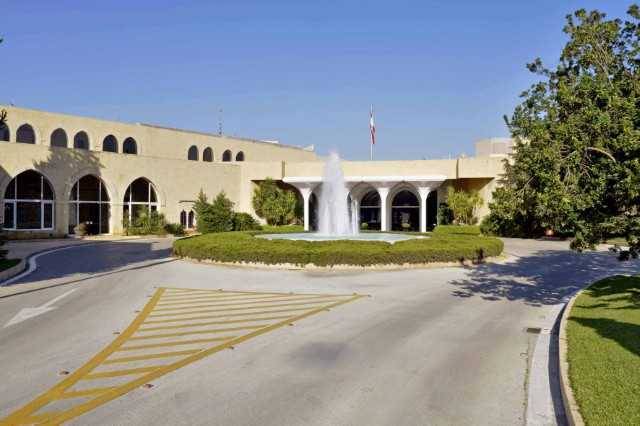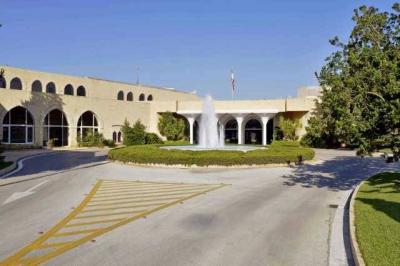The recent movement of the ambassadors of the Quintet suggests that Lebanon is moving against the regional tide. While the region escalates and complicates, Lebanon seems to be on its way back from the vacuum. Recently, ambiguous signs emerged indicating that the reasons for the failure to elect a president, prior to and during the Gaza war, may be nearing an end, according to reports from "Al-Akhbar."
The ambassadors' tour is based on a new initiative agreed upon between President Nabih Berri and the National Moderation Bloc, aiming to overcome obstacles in the path to electing a president. Their announcement of their intention to visit the various references, leaders, and blocs this time signals a different seriousness. The difference in the ambassadors’ movement is also in the substance of the attempt, not just its form. Previously, during meetings in Beirut and before that in Paris, New York, and Doha, the Quintet approached the presidential election in a reversed manner: publicly discussing the qualifications they see in candidates and urging haste in their election, while secretly each member promoted a particular candidate they supported.
What they ignored in their previous movement was the crux of the issue: their disregard for the importance of the two-thirds quorum in the Parliament and the means to achieve it as the key to electing the president, not the qualifications or the candidate. The ambassadors' movement yesterday seemed to correct their course as they became aware of the positions and influence of the blocs on the quorum's completion.
The new factor in the efforts of the five ambassadors is attributed to a draft agreement between the Speaker of Parliament and the National Moderation Bloc, which they reviewed and recorded observations that justified a different and broader activity. The ambassadors were closely following the movement initiated by the six deputies’ bloc (the deputies of Akkar, Miniyeh, and Dinniyeh) centered on three points: meeting, quorum, and election through open sessions, which they soon agreed to and anticipated the outcome of the bloc's efforts.
These points aimed to reconcile what the bloc desired and what Berri had called for since the presidential vacancy: a one-day dialogue instead of seven days, consultations instead of a dialogue table leading to the same desired outcome, which is the election of the president, agreeing on one or more candidates in preparation for a vote, and sessions that allow for multiple rounds of voting beyond just the first and second. There was a commitment to attend the sessions with a two-thirds quorum and not to leave the room. The initial formulation of the initiative faced obstacles, the most notable being Hezbollah's reluctance to receive the deputies repeatedly and express its opinion on it.
Then new obstacles arose that were not included in the initial draft, which the National Moderation Bloc attributed to new conditions proposed by the Speaker of Parliament that he insisted on, notably two formal points that undermined the overall initiative: the Parliament would officially direct the invitation to consult as it was derived from it, and it would be chaired by him or the Deputy Speaker during the agreed consultations. The opposition Christian blocs opposed the idea of consultations chaired by any party, especially by Berri, and likewise rejected the call being issued from the Parliament.
When the National Moderation Bloc brought the new two conditions to the five ambassadors, they rejected them and insisted on consultations without an invitation and without a chair, emphasizing that the priority should be solely on electing a president in successive open rounds.
The dialogue between Berri and the bloc revived and ended two weeks ago with an amendment to the initial initiative, expanding it into ten items that incorporated what the bloc had proposed and what the Speaker had requested to include. According to "Al-Akhbar," the أبرز ما تناولته هي:
- Inviting the heads of blocs and representing all according to their sizes without excluding anyone.
- The General Secretariat of the Parliament would direct the invitation, provided it is held at the Parliament’s headquarters.
- The Speaker would chair the consultations unless a team objects, in which case it would be assigned to the Deputy Speaker.
- A one-day consultation leading to a round table during which candidates, one, two, three, or even more, would be agreed upon, followed by a session for the election.
- A commitment from all blocs without exception to adhere to the two-thirds quorum and not to disrupt it after the first round of voting, similar to the past twelve sessions.
- Sessions would allow up to four consecutive rounds a day, providing opportunities for consensus on electing a president. If after the four rounds a president is not elected, the record would close, and the council would convene the next day. The four rounds aimed to maximize chances for a majority between the second and fourth rounds if the first round falls short of the two-thirds requirement.
This term recognizes the insistence of the Speaker on closing the session in which a president cannot be elected and the demands of the five ambassadors, while the National Moderation Bloc also took into account those calling for an open session until a president is elected. The new equation is: open sessions with consecutive rounds, not consecutive rounds for an open session.
Except for the two points regarding the invitation and the presidency of the consultation, the five ambassadors welcomed the initiative and immediately engaged in it. One of the first signs of their involvement was their meeting yesterday with the Speaker of Parliament and Maronite Patriarch Bechara Boutros al-Rahi, as they plan to continue their activities in the coming days. The ten points reached some blocs, some of which supported them, such as the Free Patriotic Movement and independent deputies, while others expressed reservations or opposed them, like the Christian opposition led by the Lebanese Forces and the Kataeb Party. Two major relevant parties have refrained from expressing their opinions thus far: Hezbollah and the Marada Movement.
Some aspects of the ten-point initiative are also a subject of debate. Its two merits are that there would be no qualifications, vetoes, or names before sitting at the consultation table, from which candidates would emerge, and the commitment to the two-thirds quorum and not to undermine it in all voting rounds. However, the negative aspect—its disaster—is the establishment of a precedent of requiring a dialogue or consultation table before electing the president, later transforming it into a rule that justifies the vacuum and ties any election of the president to pre-agreed consensus before going to Parliament, which completely contradicts what Article 49 of the constitution stipulates.
The fear of this precedent is exacerbated by granting the Parliament the authority to direct the invitation and linking it to the minutes of the consultation session, turning it into an official document. This creates two powers for the Parliament: a binding constitutional duty to elect the president and a realistic recognition of preempting the election by requiring a table for consultation or dialogue to which the blocs are invited, making consensus within it a condition for electing the president.




